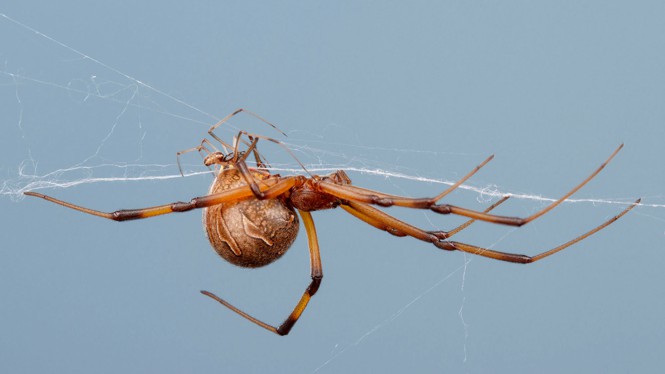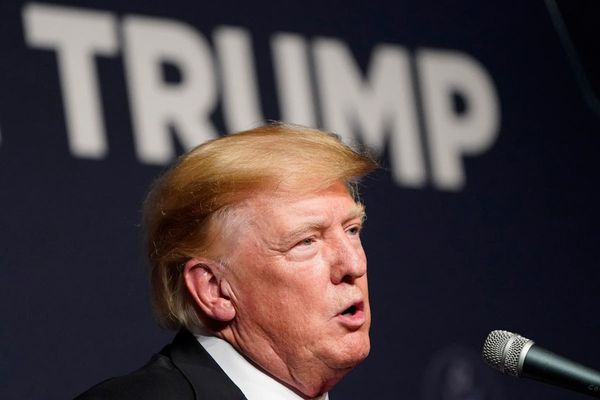
This is an edition of The Atlantic Daily, a newsletter that guides you through the biggest stories of the day, helps you discover new ideas, and recommends the best in culture. Sign up for it here.
Federal and state prosecutors may soon need to decide whether to bring charges against a former president and current front-runner for the Republican nomination.
But first, here are three new stories from The Atlantic.
- The myth that America’s abortion laws are more permissive than Europe’s
- America is running out of “COVID virgins.”
- The Webb space telescope is a time machine.
Double Trouble
There is a reason I’ve written a number of articles and newsletters about Donald Trump’s potential criminal responsibility for his effort to overturn the 2020 presidential election. Investigations evolve. New evidence emerges. And the emerging evidence is increasing Trump’s legal risk on two key fronts. First, did he incite the attack on the Capitol on January 6? Second, did he engage in a criminal scheme under Georgia state law to reverse the results of the presidential election there?
To understand the incitement argument, we have to begin with the law. Federal law imposes criminal penalties on any person who “incites, sets on foot, assists, or engages in any rebellion or insurrection against the authority of the United States or the laws thereof, or gives aid or comfort thereto.”
Yet this provision has to be read in light of the very strong First Amendment interests at play. Americans have a right to call for even violent civil unrest, unless “such advocacy is directed to inciting or producing imminent lawless action and is likely to incite or produce such action.” This is a very high bar to clear, but Donald Trump’s conduct just might clear it.
Since the mob actually launched its violent assault during and immediately after Trump’s speech urging them to march to the Capitol, the “imminence” test is plainly met. Thus, the key question is whether Trump actually intended the violent result. If you think the answer is obvious (after all, he whipped the crowd into a frenzy and sent them straight to Congress), then think again. The case is closer than you might think.
Trump’s legal defense primarily depends on statements and tweets that urged the crowd to march “peacefully and patriotically” and then later to “remain peaceful” and “stay peaceful.” Ordinarily such calls for calm would end the criminal inquiry. How can you prosecute a man for incitement when he calls for peace?
But that’s not all he said, and that’s not all he did. As I explained at length in a previous story in The Atlantic, the totality of the circumstances changes the equation. He summoned the mob (promising the protest would be “wild”), there’s evidence he knew the crowd was armed, and he told that same crowd to “fight like hell.” Other speakers urged “trial by combat” and asked the crowd to sacrifice “their blood, their sweat, their tears” and even perhaps their very lives.
Then, when the attack was under way, he inflamed the crowd by tweeting that “Mike Pence didn’t have the courage to do what was necessary.” Did yesterday’s hearing add anything to this narrative? Yes, modestly. Here’s a summary of the key evidence, from The New York Times:
As a mob of his supporters assaulted the Capitol, former President Donald J. Trump sat in his dining room off the Oval Office, watching the violence on television and choosing to do nothing for hours to stop it, an array of former administration officials testified to the House committee investigating the Jan. 6 attack in accounts laid out on Thursday.
In a final public hearing of the summer and one of the most dramatic of the inquiry, the panel provided a panoramic account of how, even as the lives of law enforcement officers, members of Congress and his own vice president were under threat, Mr. Trump could not be moved to act until after it was clear that the riot had failed to disrupt Congress’s session to confirm his election defeat.
If I was standing in front of a jury, I’d ask them to ponder a question—if Trump truly wanted only a “peaceful” protest, why did he passively allow the horrific violence to unfold? Why was it ultimately up to Mike Pence to skip the chain of command and call out the National Guard?
The answer, I’d argue, was that everything was happening precisely as Trump had intended. The mob was supposed to march to the Capitol. It was supposed to stop the certification. Why would Trump call it off when it was doing exactly what he wanted it to do?
Again, there are strong defenses to any prosecution for incitement. Trump’s calls for peace may convince the Department of Justice that an incitement prosecution is simply too tough to mount, in spite of all the additional evidence outlined above. Or Trump’s calls for peace may convince a judge that the high standard of incitement simply isn’t met.
But that doesn’t mean Trump is safe. To understand why, let’s turn briefly to Georgia—the state where evidence of his alleged criminality has always been the most compelling.This week Fulton County District Attorney Fani Willis designated the 16 Republicans who signed certificates falsely claiming they were Georgia’s presidential electors to be “targets” of her criminal probe into efforts to overturn Georgia’s presidential election results.
The reason for the target designation is not hard to see. Georgia election law not only makes it a crime to solicit election fraud; it specifically criminalizes willfully tampering with “any electors list, voter’s certificate, numbered list of voters, ballot box, voting machine, direct recording electronic (DRE) equipment, electronic ballot marker, or tabulating machine.” (Emphasis added.)
Indeed, as the criminal investigation plays out, the fake-electors scheme may well be the most clearly illegal element of the entire effort to overturn the election. Their designations represent a series of concrete, overt acts that move beyond verbal bluster about election fraud and raise the question—who initiated, approved, and/or directed the scheme?
As I’ve written before, Trump’s recorded demand that Georgia Secretary of State Brad Raffensperger “find 11,780 votes”—along with his not-so-veiled threat that Raffensperger faced a “big risk” of criminal prosecution if he failed—was already quite legally problematic. Add this threat to the fake-electors scheme, and the elements of a criminal conspiracy come clearly into view.
At the end of the day, it is highly likely that the key question for federal and state prosecutors won’t be Can we make a case against Trump? Instead, it will be Should we make a case against Trump? Should the government seek to prosecute and imprison a former president of the United States? Does that calculus change if that former president is also the current front-runner for the Republican nomination?
I won’t pretend the answers are easy. I won’t pretend prosecution isn’t a risk. But as the evidence accumulates, the moral and political imperative becomes apparent. The former president isn’t a king. He’s a citizen of a constitutional republic, and citizens should stand trial when the evidence indicates they may have committed serious crimes.
Related:
- The inescapable conclusion from the January 6 hearings
- What ordinary Republicans think about January 6
Today’s News
- Steve Bannon was found guilty on two counts of contempt of Congress for failing to comply with subpoenas issued by the January 6 committee. For each count, he faces a fine of up to $1,000 and a maximum of 12 months in prison. Read Jennifer Senior’s profile of Bannon from the July/August issue of The Atlantic.
- Ukraine and Russia have reached a deal to resume exports of grain from Ukrainian Black Sea ports, which may help alleviate the global food crisis.
- State senators in South Carolina introduced a bill that would ban the use of the internet or phones to share information about how to obtain an abortion.
Dispatches
- Unsettled Territory: Imani Perry argues that social media has conditioned people to treat tragedies as spectator events.
- The Books Briefing: The effects of climate change are making their way into every facet of our world—including our literature, Emma Sarappo writes.
Evening Read

The Spiders That Choose Death
By Katherine J. Wu
Among spiders, sex doesn’t just create life; it can also end it. Males of many species—including orb-weaving spiders, widow spiders, and wolf spiders—find their fortunes turning on a dime, as the females they’ve seduced begin to devour them alive, sometimes even before insemination is complete. Most eight-legged bachelors go to great lengths to avoid being eaten by their lover: Some try to massage her into a stupor, or bind her legs up with silk; others play dead, or detach their own legs to distract her with a precoital snack. It’s all in service of survival, so the male might live to mate another day.
More From The Atlantic
- Why we hate rising prices more than we fear losing our jobs
- The risk and opportunity of online fertility groups
- The Gray Man takes the stoic-spy cliché way too far.
Culture Break

Read. The High Sierra: A Love Story explores the beauty of the High Sierra mountains.
Feeling a little less adventurous? Zain Khalid’s debut novel, Brother Alive, captures the mood of New York City after two years of the pandemic.
Or try something from our summer reading guide, with 21 books to match your mood.
Watch. Nope, which hits theaters this weekend. Our critic describes the latest Jordan Peele horror flick as “spectacular, indulgent, and brutal.”
For something a little more sentimental—but no less explosive—the documentary Fire of Love is in select theaters across the U.S. and Canada.
Looking for a deeper cut? Try one of these 26 brilliant films that critics were wrong about.
Listen. Three years after her Grammy-nominated album, Cuz I Love You, Lizzo continues her “heartwarming world-domination plan” with Special, our critic writes.
Kate Lindsay contributed to this newsletter.










